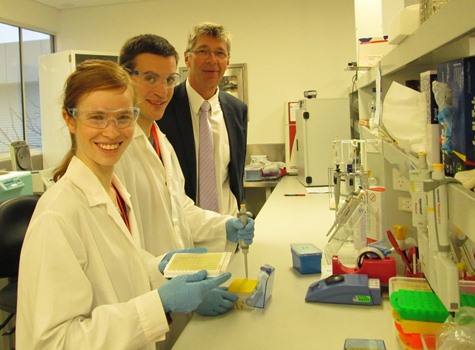 A
Charles Sturt University (CSU) academic is renewing his call for Australian
governments to take preventative action in Australia to curb the diabetes epidemic.
A
Charles Sturt University (CSU) academic is renewing his call for Australian
governments to take preventative action in Australia to curb the diabetes epidemic.
Following the release of the World Health Organisation's (WHO) first global report on diabetes, Dr Herbert Jelinek from the CSU School of Community Health said Australia is not doing enough.
"What we are doing now in the area of diabetes in Australia is not working," Dr Jelinek said.
"It is not focussed on the prevention of diabetes, rather the emphasis is on acute care for people who are well into the disease and all it complications."
The WHO report found the number of people living with diabetes has almost quadrupled from 108 million in 1980 to 422 million adults in 2014.
Dr Jelinek said, "One of the interesting findings in the WHO report is that the prevalence is much higher than what was predicted in the late 1990s. Projections done in 1997 suggested only 221 million people would have diabetes by 2010."
These figures include the three main types of diabetes: Type 1, Type 2 and Gestational. Diabetes is a chronic disease that occurs either when the pancreas does not produce enough insulin or when the body cannot effectively use the insulin it produces. Insulin is a hormone that regulates blood sugar.
"Australia needs to implement more rigorous population all-in-one screening. That is, testing for all complications at one visit. It needs particularly to be conducted thoroughly in regional and rural Australia and Indigenous populations due to the higher rates of diabetes.
"Arguments made against such screening are not sufficient enough given the epidemic of this condition.
"The existing diabetes clinics and centres are mostly based in metropolitan areas and mainly deal with people suffering from type 1 diabetes, the cause of which is unknown.
"During 10 years of conducting all-in-one screening at Charles Sturt University, I was successful in finding other medical conditions and very early signs of diabetes in the community.
"Prevention is the key and that is what governments need to start funding," said Dr Jelinek.
The CSU academic has also dismissed arguments about the introduction of a sugar tax in Australia.
"I think that a sugar tax would not do much as there is no indication who exactly will be taxed? If it is the company, then they pass on the tax anyway and just like with cigarettes and alcohol, dramatic changes in behaviour are not seen."
Dr Jelinek is a Senior Lecturer in biomedical science the School of Community Health at CSU in Albury-Wodonga. His research is in diabetes and diabetic complications focusing on strategies for automated identification of cognitive, cardiac, peripheral vascular and retinal complications using bio signal and image processing.
He established a free, on-campus one-stop screening unit for diabetes and cardiovascular disease at CSU in Albury-Wodonga which ran for 10 years until 2014.





Social
Explore the world of social